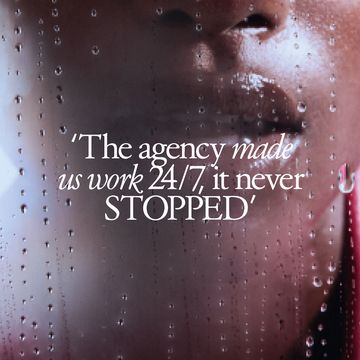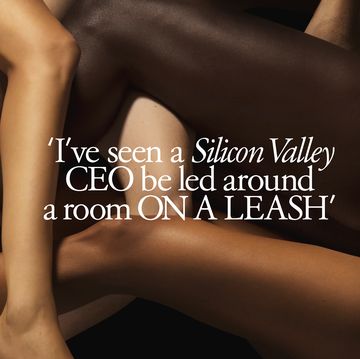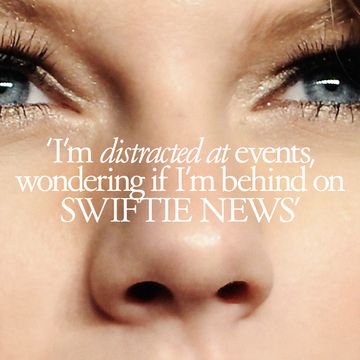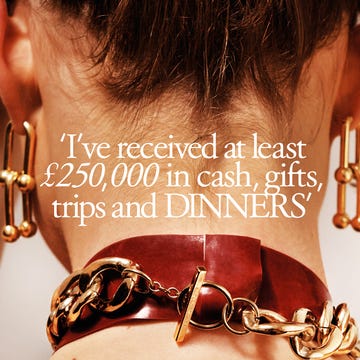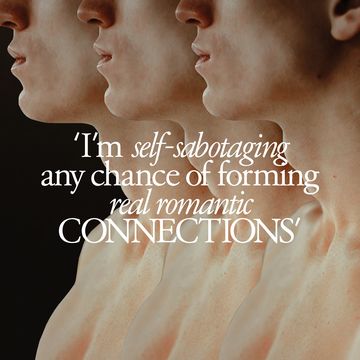*Warning - some of the topics discussed in this first person account relating to alcohol dependance may feel triggering*
My worst fear in life has always been ending up like my mum. Sure, plenty of women feel the same, but it’s not premature greying I’ve been worried about, it’s inheriting her alcohol addiction – an addiction that has cut fractures so deep in my family, I don’t think they can ever be bridged.
Today, the nightmare has been realised. I’m in my late twenties, with my very own addiction. I’m hiding bottles of red wine in my clothes basket, topping up my coffee with vodka, constantly chewing mints so my housemates don’t smell the stench of alcohol on my breath. I know which corner shop owners won’t make a comment when I buy yet another bottle or two at 10am on a Tuesday. I know exactly how much to drink to turn off my racing thoughts and gnawing anxieties, without becoming comatose; the amount that keeps me functioning on the outside, answering the right questions on a work Zoom call, whilst comfortably numb inside. I know that red wine is better than white because you don’t have to refrigerate it, and what time to creep out of my room with all the empty bottles so no one will see me.
I know all this and I hate myself for it because the more I do it, the more I am like my mum, going through the same motions that destroyed mine and my brother’s childhoods. Perhaps worst of all, it was a man leaving me that sparked it, just like for my mum – another of her weaknesses I’d promised myself never to fall victim to.
My mum’s drinking started when I was 11-years-old, after my dad left us. My memories of that time are a blur: a week or two of explosive arguments eavesdropped through the stair banisters, my dad’s suitcase packed up by the door, a brisk kiss on the forehead and a vague promise of, 'See you soon'. He left us for another woman – someone from his work I later found out, younger, prettier, a total cliché – and quickly set up a new life with her.
It’s like my mum stopped being my mum after that, withdrawing into a grey, impenetrable shell that neither me nor my brother could break through. I associate those early days of her drinking with her closed bedroom door, some trashy TV show blaring, her curtains drawn. It was still a secret at that point, clinking bottles late at night and slurs that she covered up with coughs or changes in subject. I quickly learnt how to look for the signs that it was ‘mummy’s bad day’, scurrying out of her way before the drink and the wrong question set her off. Thinking about it now, it’s almost like I’ve copied her, action by action.
For years we lived in that terrifying stasis – I was never quite sure which mum I would get picking me up from school or a friend’s house, anxiety bubbling up like acid as the home time bell drew near. I hated anyone knowing about her, like she and her habit were a hot, shameful secret to bury. Even as pre-teen, I knew that there was a huge taboo surrounding addiction.
The worst thing about my mum’s drinking is that, like all addicts, she refused to believe that she had an issue. As a functioning alcoholic, she’d developed this sick ability to go through the motions of life, even half a bottle, or more, down. I’m sure the people she worked for knew, they would’ve been stupid to have missed the signs, but as a self-employed cleaner, she spent most of her work days alone with the radio and a flask of something. As long as she didn’t nick anything and kept the place spotless, who was going to complain?
By age 12 I was outwardly confronting her about the stash of vodka bottles hidden in her wardrobe, demanding to smell her breath, and refusing to get in the car if she dared to grab her keys. My brother and I were regular bus pass holders from the very start. I’m not sure how many desperate pleas I made for her to stop. Tearful ones, angry ones, calm ones; I remember writing her a letter one Christmas, begging Santa to bring back my old mum, knowing that she would be the one reading it. Even though she made promises over and over to change – to me, my brother, her own parents, who were the only adults I trusted – she never did. And my dad didn’t to keep us involved in his new life as he’d promised.
My own relationship with alcohol started when I was 21 and a third year student in Bristol, far from the Newcastle suburb that I had grown up in and far from my mum who I had cut off all contact with, aged 16. I was far enough away from the very few people who knew the truth – my grandparents who took us in and my two best friends. Miles from the very worst memories of my mum, in hospital after a car accident where she had been black-out drunk and drifting into oncoming traffic. Far from her constant phone calls promising to change once we finally left and from the police who had to physically carry her off my grandparents doorstep. My first drink was a small glass of prosecco at my grad ball. I was surrounded by new people who didn’t know the old me or my sorry story. It was a drink not heavy with all the associations and accusations that I know I would get back home. My brother is still teetotal today.
From that moment on, moving from Bristol to London for a shiny, exciting new life in marketing, alcohol became my friend rather than enemy. Though I always treated it with a wary respect. One small glass of wine, but only with dinner. A toast for a friend’s engagement party or new promotion. After work cocktails, but always with friends.
That was late 2019 me; happy, healthy, earning good money and in a long-term relationship with a man I loved. But at the start of 2020, he left me for another woman, and it was my turn to be heartbroken.
I moved out of our flat and into a house share. It was here my drinking shifted, becoming an emotional crutch and DIY therapy. It began first with friends, in the healthy way that all newly single or heartbroken women drown their sorrows; one or two glasses of chardonnay over pizza or on a girls’ night out. But those glasses never stopped, they multiplied. Soon it was a bottle at least each night, sometimes two. Instead of stopping at the after-work drinks, I would drop into my local corner shop to stock up on the way home. At the time, I had a busy mix of work, social engagements and the gym to distract myself from my problem. Then lockdown happened and I was cut off from the one thing I had to justify my drinking: other people.
It was a month or two into lockdown that I realised I have a problem. Stuck at home, without the usual distractions, I was constantly thinking about the next drink, when I could sneak one or how I could justify another trip to the Off Licence. Originally, all I wanted was to dull the pain of a break up, now I feel like I can’t sleep without a drink; my thoughts are too loud. I’m sure my housemates have realised what’s going on, they’re not stupid. Like me aged 11, they’ve pieced together the clues and I know they’re worried about me. Twisted as it is, it’s often been easy to blow them off – everyone it seems has an alcohol problem in lockdown to joke about.
I do want help. I know that I need it and where to find it. Thanks to my mum’s situation, I know how difficult it is to do alone, but I’m scared to open up to anyone, especially my family, my little brother. I feel like I’ve failed them by following in my mum’s footsteps.
Most of all, I’m scared to admit to myself that I’m more like my mum than I ever thought I could be. Even though we rekindled our relationship a few years ago after she got herself sober, opening up to her would be too painful. These are old wounds that haven’t quite healed yet.
For help and support for alcohol dependance visit drinkaware. You can call their helpline on 0300 123 1110 (weekdays 9am–2pm, weekends 11am–4pm). Or use their online chat service 9am - 2pm (UK time) from Monday to Friday.
If you've got a story that you think would work for The Secret Lives of Women, please email secretlives@elleuk.com
Like this article? Sign up to our newsletter to get more articles like this delivered straight to your inbox.
In need of more inspiration, thoughtful journalism and at-home beauty tips? Subscribe to ELLE's print magazine today! SUBSCRIBE HERE









